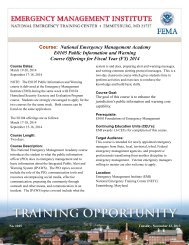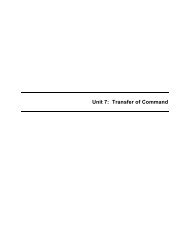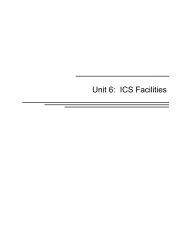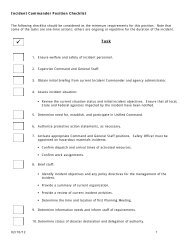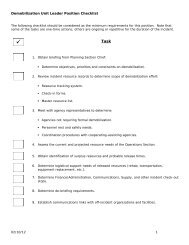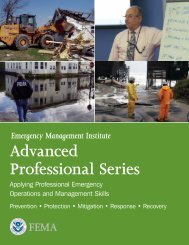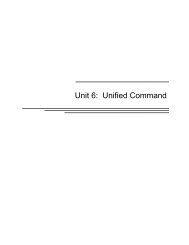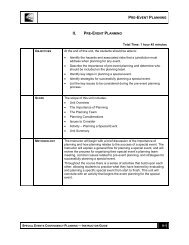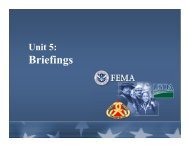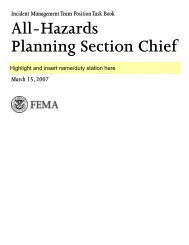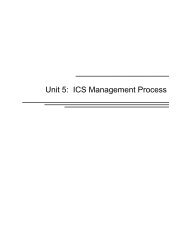EMI Course Catalog - Emergency Management Institute - Federal ...
EMI Course Catalog - Emergency Management Institute - Federal ...
EMI Course Catalog - Emergency Management Institute - Federal ...
Create successful ePaper yourself
Turn your PDF publications into a flip-book with our unique Google optimized e-Paper software.
EmErgEncy managEmEnt InstItutE • 2011-2012 • catalog of coursEs<br />
EOC <strong>Management</strong> and Planning staff, IMT Planning<br />
and Command Staff, <strong>Emergency</strong> <strong>Management</strong><br />
Agency staff, Public Information Officers, Local<br />
Elected and Appointed Officials, Venue Sponsor<br />
Staff, Convention and Visitors Bureau Staff, and<br />
Transportation Planners).<br />
Prerequisites:<br />
Recommended: IS-15, Special Events Contingency Planning;<br />
IS-100.b, Introduction to the Incident Command System<br />
(ICS), ICS-100; and IS-200.b, Incident Command<br />
System (ICS) for Single Resources and Initial Action Incidents,<br />
ICS-200.<br />
Community-Specific Integrated <strong>Emergency</strong><br />
<strong>Management</strong> <strong>Course</strong>s (E/L930)<br />
Community-specific IEMCs place emphasis on a<br />
specific jurisdiction’s risks, response capability,<br />
target capabilities, and short-term recovery issues.<br />
They are tailored to fit the jurisdictions and are<br />
based on a selected hazard scenario. <strong>Course</strong> methodologies<br />
include classroom instruction, group<br />
planning sessions, and exercises that allow for structured<br />
decision making in a learning environment. A<br />
key outcome of this IEMC is to provide participants<br />
with the awareness and skills to carry out emergency<br />
plans, policies, and procedures related to disaster<br />
response and assist with making the transition from<br />
response activities to short-term recovery.<br />
Steps in the Community-specific IEMC<br />
Application Process<br />
• The chief elected official of the jurisdiction<br />
submits a letter of request, addressing the belowspecified<br />
information, to his/her respective State<br />
office of emergency management.<br />
• If the State office of emergency management<br />
supports the request, it will attach its letter of<br />
endorsement outlining how acceptance of this<br />
request will meet State emergency management<br />
objectives. Note: At this stage in the request, the<br />
State may elect not to forward the request but,<br />
instead, work with the community (especially if<br />
the community is under 100,000 in population)<br />
63<br />
to conduct the G110, <strong>Emergency</strong> <strong>Management</strong><br />
Operations <strong>Course</strong> (EMOC) for Local Governments.<br />
• If endorsed by the State <strong>Emergency</strong> <strong>Management</strong><br />
office, the application is forwarded to the<br />
appropriate FEMA Regional Office for review. The<br />
FEMA Regional Office includes its endorsement<br />
for each jurisdiction’s application. If more than<br />
one jurisdiction is submitted, the Region will<br />
prioritize its recommendations.<br />
• Applications must be received at <strong>EMI</strong> from the<br />
FEMA Regional Office no later than January 15<br />
each year. Between January 15 and February<br />
15, <strong>EMI</strong> staff reviews the applications and ranks<br />
them based on Regional priority and information<br />
provided in the requests. Final selection is made<br />
by March 1.<br />
• By March 31, communities that have been<br />
accepted will be notified, as well as communities<br />
that are not accepted. Appropriate FEMA Regional<br />
Offices and State emergency management offices<br />
are also notified.<br />
• Communities that are not selected and that want<br />
to be reconsidered for the following year must<br />
re-apply.<br />
Communities must include the following<br />
information in their application:<br />
• Population of jurisdiction.<br />
• A brief description of the government structure<br />
(include organizational chart); clarify if the<br />
request is for a single jurisdiction (e.g., one city)<br />
or a combination of jurisdictions (e.g., a city and<br />
county).<br />
• A narrative that includes the status of emergency<br />
management in the community, including past<br />
disaster history.<br />
• <strong>Emergency</strong> management training and exercise<br />
history.<br />
• Specific hazards facing the jurisdiction and/or<br />
specific hazards requested to be addressed in the<br />
IEMC.<br />
FEdErAL EmErgENCy mANAgEmENT AgENCy<br />
RESIDENT COURSES—<br />
INTEGRATED EMERGENCY<br />
MANAGEMENT



